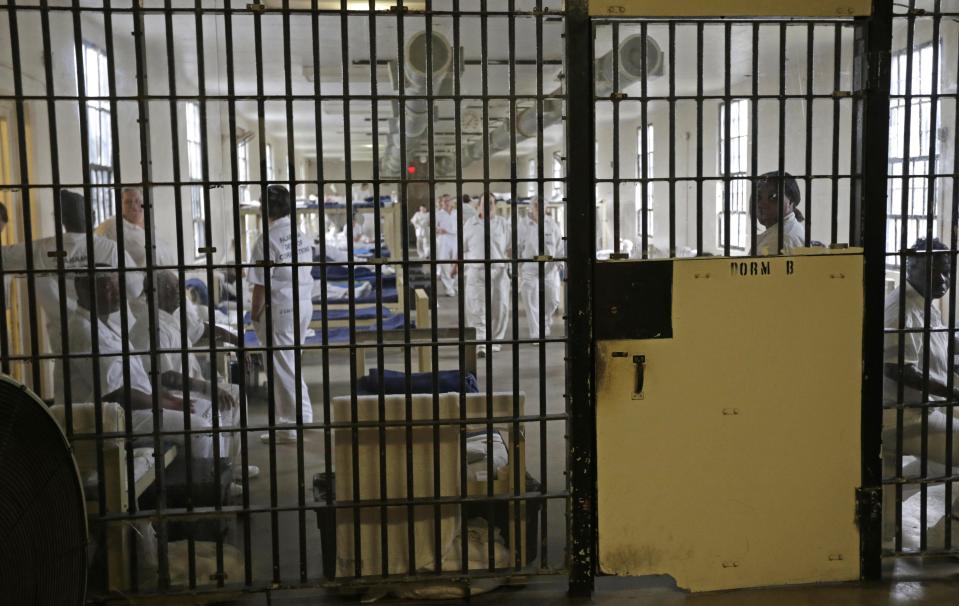I shot my abuser to escape. Why are so many domestic violence survivors like me in prison?
My name is April Wilkens, and I’m a 52-year-old domestic violence survivor in my 25th year of incarceration. I’m imprisoned at Mabel Bassett Correctional Center in McLoud, Oklahoma.
Prior to being locked up, I was verbally, mentally, physically and sexually abused by my ex-fiancé. The abuse left me utterly broken and humiliated.
In 1998, my ex-fiancé brutally raped me, handcuffed me and threatened to sodomize and kill me. As he lunged toward me, I shot him with one of his own guns and could not stop firing until the gun was empty. He was shot eight times. Later that day, a sexual assault nurse documented my numerous injuries, including bruises all over my body and vaginal tears. Despite my injuries, the prosecution asserted, “This wasn't rape, members of the jury; this was consensual sex.”
The jury convicted me of first-degree murder, their only option, and suggested the minimum sentence of life in prison with parole possible after 15 years. Despite being recommended for parole by the state’s own parole investigators, I have been denied parole four times and commutation twice.
Opinions in your inbox: Get exclusive access to our columnists and the best of our columns
Countless survivors are incarcerated – and the odds are stacked against us
I’m just one of countless domestic violence survivors behind bars in America. Studies indicate nearly 90% of women imprisoned in some states were domestic violence victims prior to incarceration.
The odds are certainly stacked against women in Oklahoma. Mothers, daughters, sisters and even grandmothers like me are far more likely to be abused and end up behind bars in Oklahoma than in nearly any other state.
'Who are you going to believe?': When a prison is known as the 'rape club,' our justice system has a credibility problem
Criminal justice reform: Trump, Kim Kardashian got me clemency. Second chances aren't soft on crime.
Prosecutors hold too much power: Plea bargaining and mass incarceration go hand in hand. We need to end both.
And consider this: Domestic violence reports in Oklahoma increased annually from 2016 to 2020, with domestic violence reaching a 20-year high in 2020.
Oklahoma consistently has one of the highest rates of women killed by men in America. It’s deplorable that so many of Oklahoma’s female prisoners are domestic violence survivors.

Prison is teeming with abuse and violence. Nearly every aspect of a prisoner’s life is controlled. The strip searches are especially dehumanizing, particularly for rape survivors like myself. In many ways, being in prison is like being in an abusive relationship.
To this day, in almost every state including Oklahoma, it is unusual for courts to consider the abuse a survivor has suffered in sentencing. What does it say about a society that it treats some of its most victimized and vulnerable citizens with so little compassion and mercy? How do we fix such a terrible injustice?
We need to consider prior abuse at sentencing
There is hope. In 2019, the Domestic Violence Survivors Justice Act was passed in New York, allowing courts to give shorter sentences to abuse survivors who can show that the abuse they suffered contributed substantially to the crime for which they were convicted.
Numerous abuse survivors have received shorter sentences since then. Now, attorneys Colleen McCarty and Leslie Briggs, with Oklahoma Appleseed Center for Law and Justice, are building the Oklahoma Survivor Justice Coalition to educate and encourage Oklahoma lawmakers to pass a similar law.
Rep. Toni Hasenbeck plans to introduce the bill in Oklahoma during this legislative session.
Opinion alerts: Get columns from your favorite columnists + expert analysis on top issues, delivered straight to your device through the USA TODAY app. Don't have the app? Download it for free from your app store.

Like me, about 85% of women imprisoned in Oklahoma are mothers, making Oklahoma’s astronomical female incarceration rate even more devastating.
My son was only 7 when I was locked up, and our separation has been extremely difficult for us. He is 31 now with a child of his own. I think of my 4-year-old granddaughter often and pray for change so that neither she nor anyone else ever has to go through what I have gone through.
Everyone, especially survivors and others impacted by domestic violence, should join the movement and follow #SurvivorsDeserveRealJustice to help survivors in prison and those facing criminal charges.
If you or someone you know is in a domestic violence situation, help is available. Contact the National Domestic Violence Hotline at 800-799-7233 or thehotline.org
April Wilkens is an inmate at Mabel Bassett Correctional Center in McLoud, Oklahoma.
You can read diverse opinions from our Board of Contributors and other writers on the Opinion front page, on Twitter @usatodayopinion and in our daily Opinion newsletter. To respond to a column, submit a comment to letters@usatoday.com.
This article originally appeared on Oklahoman: I killed to survive domestic violence. Why am I in prison?

